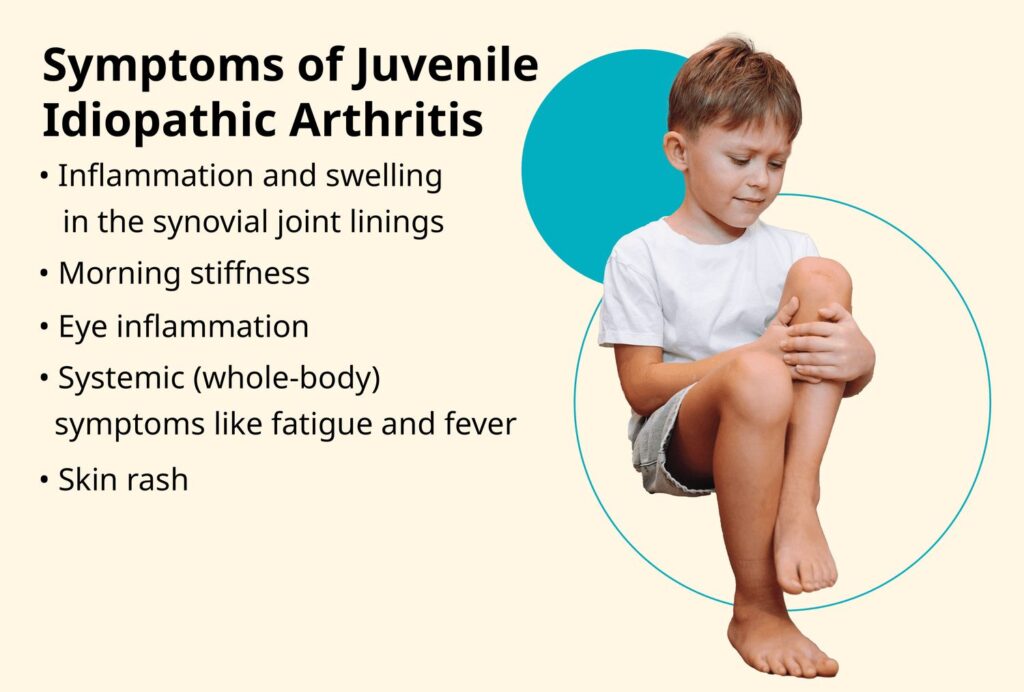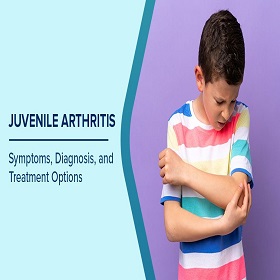 As soon as one hears the term Arthritis, they associate it with old age. After all, we all picture children with a bundle of energy, running and jumping around. But unfortunately, children too can be affected by the diseases of the joint.
Juvenile Idiopathic Arthritis is one such disease that affects the joints of children.
As soon as one hears the term Arthritis, they associate it with old age. After all, we all picture children with a bundle of energy, running and jumping around. But unfortunately, children too can be affected by the diseases of the joint.
Juvenile Idiopathic Arthritis is one such disease that affects the joints of children.
What Is Juvenile Idiopathic Arthritis?
This is the most common type of arthritis that children can develop. It can affect the joints in any part of the body and varies in severity and extent depending on the type. Unlike other arthritis in children which are shorter-lasting, this is a long-lasting condition.What happens in Juvenile Idiopathic Arthritis?
Parents may often be curious to know, that how children who are still growing, get affected by such an illness. This type of Arthritis is autoimmune in nature. This means that the immune system of such children fails to identify the parts of their own joints. It considers them to be foreign or harmful and starts destroying them. The main target of the immune system in this disease is the synovium, the tissue lining the inside of the joints. Once the synovium is targeted it produces more synovial fluid (the fluid inside the joints that keeps them lubricated and flexible), this in turn makes the joint swell up and causes pain, stiffness, and restricted movement. With persistent destructive activity, adjacent areas like cartilage and bone can also be affected thereby leading to more debility. Unlike adults, children are growing and have a different anatomy. This condition of the joints in children is thus addressed by a specialist Pediatric Immunologist and Rheumatologist.Nutrition in the Management of Juvenile Idiopathic Arthritis
While medical management, including nonsteroidal anti-inflammatory drugs (NSAIDs) and biological therapies, plays a crucial role in symptom control, emerging research highlights the significance of nutrition in managing JIA. A well-balanced diet can help reduce inflammation, strengthen the immune system, and improve overall well-being, and what can be more exciting than this for the parents and caregivers!Nutrition and Inflammation: The Link
Inflammation is the primary driver of JIA symptoms. Certain foods and nutrients have pro-inflammatory or anti-inflammatory effects, making diet an important aspect of disease management. A diet high in processed foods, refined sugars, and unhealthy fats can exacerbate inflammation, while a diet rich in whole foods, antioxidants, and healthy fats may help reduce inflammatory markers and alleviate symptoms. Moreso, children who suffer from JIA may be deficient in certain nutrients due to the medications they take, and due to the ongoing inflammatory activity in the body. A well-balanced diet ensures essential nutrition, contributing to improved overall health.Some Key Nutrients in the Management of JIA
Several nutrients have been identified for their potential role in modulating inflammation and supporting joint health in children with JIA. Some of these nutrients are listed below: Fiber-rich foods: Research suggests that fiber-rich foods can help in suppressing inflammation. Whole grains should be opted for instead of processed snacks for children who suffer from JIA. Fiber also helps in better motility of the digestive tract, thereby helping in the absorption of nutrients while flushing the toxins out. Clean Protein: Protein is extremely important for overall growth and development. It also helps JIA children cope with the added demands of long-term illness. Clean protein sources, such as lean poultry, fish, legumes, and plant-based proteins, support muscle strength and joint health in children with JIA. These proteins help reduce inflammation while providing essential amino acids for growth and immune function. Vitamin D: Vitamin D is crucial for immune regulation and bone health. Many children with JIA have been found to be deficient in vitamin D, which may contribute to disease severity. Sun exposure, fortified dairy products, eggs, and fatty fish are excellent sources of vitamin D. Supplementation may be necessary under medical supervision. Calcium: JIA and its treatments, particularly corticosteroids, can increase the risk of osteoporosis and poor bone development. Adequate calcium intake from dairy products, leafy greens, tofu, and fortified plant-based milk is essential for maintaining strong bones. Antioxidants: Antioxidants help neutralize oxidative stress, which contributes to joint inflammation. Vitamin C (found in citrus fruits, berries, and bell peppers) and vitamin E (present in nuts, seeds, and vegetable oils) can protect cells from damage. Selenium and zinc, found in seafood, meat, nuts, and legumes, also support immune function and reduce inflammation. Colorful fruits and vegetables: These are rich in antioxidants, vitamins, and phytonutrients that help combat inflammation in JIA. Berries, carrots, spinach, bell peppers, and tomatoes provide essential nutrients like vitamin C, beta-carotene, and flavonoids, which support immune function, reduce oxidative stress, and promote joint health. Including a variety of these in daily meals can aid in symptom management and overall well-being. Dark green leafy vegetables are rich in folate and can be particularly beneficial for kids taking methotrexate for JIA, which makes them deficient in this important nutrient.Which foods should be avoided in JIA?
It’s also crucial to know about the foods that should be avoided in JIA. Some foods may exacerbate the symptoms of inflammation and can lead to other ill-effects as well and parents and caregivers should tick them off from the diet chart to ensure good overall health in children with JIA. Processed Foods: These foods are high in preservatives with the presence of unhealthy fats, and additives that can trigger inflammation. Whole grains and fresh food should be preferred at all times. Sugar: More sugar consumption means more overall blood sugar levels. This thus leads to more bacterial growth and inflammation. Processed sugary foods including cookies and cakes, or sugary beverages like packed juices with added sugar can increase inflammation and worsen symptoms. Refined carbohydrates like white bread, pasta, and pastries can spike blood sugar and fuel inflammation. Saturated and Trans Fats plus Fried Foods: These types of fats as found in animal products and manufactured foods are responsible for the release of inflammatory products in the body. Fast food, baked goods, and animal fats like butter and cheese are some sources of such food. Excess Salt and Preservatives: As found in packaged outside food can cause fluid retention and increase joint discomfort. Artificial Ingredients: Added artificial ingredients including corn syrup, artificial dyes, and sweeteners should be avoided in children in JIA. Since these children already have an ongoing immune misfunction, giving the body additional unrecognisable substances from outside is not recommended.Some Practical Tips for Implementing a JIA-Friendly Diet
-
- Encourage Home-Cooked Meals: Preparing meals at home allows better control over ingredients and ensures a balanced diet. Freshly cooked home food is the best for the overall health of all children including the ones who suffer from JIA.
- Focus on Colorful Plates: A variety of fruits and vegetables provide essential nutrients and antioxidants.
- Stay Hydrated: Drinking enough water supports overall health and helps flush out toxins.
- Maintain Healthy Weight: Maintaining a healthy weight can reduce stress on joints. A balanced diet with adequate physical activity and healthy weight improves the overall health in JIA.
- Choose a Diet low in fat, saturated fat and cholesterol
-
Moderate the consumption of sugar in the diet
- Involve Children in Meal Preparation: Encouraging kids to participate in grocery shopping and meal preparation can make healthy eating more enjoyable.
FAQs for The Role of Nutrition in Managing Juvenile Idiopathic Arthritis: Diet Tips to Reduce Inflammation and Pain
Diet plays a crucial role in managing JIA by reducing inflammation, supporting immune function, and improving overall health through essential nutrients.
Anti-inflammatory foods such as fatty fish (rich in omega-3s), nuts, seeds, colorful fruits, leafy greens, and turmeric can help manage symptoms.
Yes, processed foods, sugary drinks, red and processed meats, trans fats, excess salt, refined carbohydrates, and potential allergens like dairy or gluten (if sensitive) should be minimized.
Yes, omega-3s found in fish, flaxseeds, and walnuts have strong anti-inflammatory properties and may help reduce joint pain and stiffness.
While dairy is a good source of calcium, some children with JIA may have sensitivities that trigger inflammation. A personalised consultation with a pediatric rheumatologist and immunologist can help identify if diary can be safe for your child.
These foods are packed with antioxidants, vitamins, and minerals that help reduce oxidative stress and inflammation, promoting joint health. Additionally, folate-rich dark green leafy vegetables can help replenish this nutrient in children on long-term methotrexate.
Yes, turmeric (curcumin), ginger, garlic, and cinnamon have natural anti-inflammatory properties that may help alleviate JIA symptoms.
Probiotic-rich foods like yogurt, kefir, and fermented vegetables support gut health, which plays a role in immune regulation and inflammation control.
Ensuring adequate intake of calcium and vitamin D through dairy, fortified plant-based milk, leafy greens, and sun exposure helps support bone health.
There is no universal diet for JIA, consulting a dietitian in coordination with a pediatric rheumatologist and immunologist is recommended for personalized guidance on specific dietary plans.
Author: Dr. Anjani Gummadi
Consultant Pediatric Immunologist and Rheumatologist




